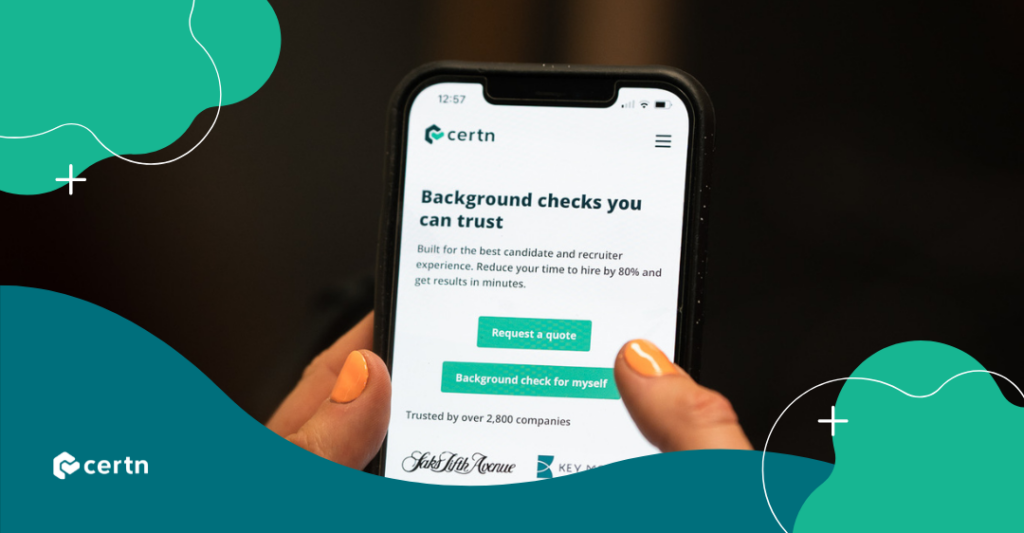Hiring mistakes cost money. Just how much, exactly? According to some estimates, a bad hire typically costs about 30% of their first-year salary. So it makes sense to try and avoid these kinds of errors when you can.
Bad hires can also cost you money because:
- it costs money to hire and train them, as well as their replacement
- they can lead to lost productivity, negatively affect product quality, or negatively impact clients
- as much as 9% of bad hires can result in legal issues
How do background checks figure into all of this? Are there any other benefits that they offer? Here are just a few of the ways they can help your hiring team.
Employment and Education Verification Can Help You Find the Best Candidates
According to CareerBuilder, the biggest problem with a bad hire is that the “Employee didn’t produce the proper quality of work.” In fact, it’s a problem hiring managers found with 67 percent of their bad hires. When an employee doesn’t have the qualifications they need to do their job effectively, that can, in turn, negatively affect everything from product quality to customer satisfaction.
So how do these employees end up getting hired in the first place? Part of it might have to do with the claims they make on their resumes. Or, to be a little more specific, just how accurate those claims really are. A survey from ResumeBuilder, for example, found that “32% of Americans admit to lying on their resume.”
Here are some of the most common lies told, according to the survey:
- 46% lied about their years of experience
- 44% lied about their education
- 43% lied about how long they held a position
- 38% lied about a previous employer
Of course, whether or not you view these as a deal-breaker could depend on the nature of the role you’re looking to fill. The stakes surrounding a healthcare or IT position, for example, are different from those surrounding a role in retail. It’s also worth considering why people lie in the first place. According to one survey, 37% of people who lie on their CV do so to hide a gap in their employment history. (However, that same study also found that 17% of those who lied did so because they weren’t qualified for the position.) Ultimately, the approach that will best serve your team will depend on the roles you’re hiring for and the level of risk your organization feels comfortable taking on.
Background Checks Help You Avoid Negligent Hiring
Background checks can also help you avoid costly mistakes like negligent hiring. “Under the doctrine of negligent hiring,” observes SHRM, “an employer is liable for harm its employees inflict on third parties when the employer knew or should have known of the employee’s potential risk to cause harm, or if the risk would have been discovered by a reasonable investigation.”
These are the kinds of mistakes that, while unlikely, can cause significant damage depending on the nature of the incident. A negligent hiring case could result in:
- property damage
- harm to an employee or customer
- damage to your company’s brand
- litigation
When a negligent hiring case does result in litigation, some studies claim that “Negligent hiring lawsuits are extremely costly to defend, and if the plaintiff is successful, a multimillion dollar award is not uncommon.” Which sounds scary—but again, these situations are uncommon and can often be avoided with the help of proper precautions. As SHRM put it, “Fear of negligent hiring litigation shouldn’t negate the emerging trend of employers giving people with criminal histories a second chance.” Many companies choose to hire individuals who have a criminal record—they just check that the offence isn’t related to the responsibilities that come with the role. Discuss the approach and policies you want to implement with your legal counsel to find the best solution for your organization.
A Good Background Check Provider Can Help Reduce Your Time to Hire
Background checks provide undeniable value. They help you avoid negligent hiring and verify that the candidates you select are who they claim to be and have the qualifications they say they do. They can even help you maintain SOC 2 compliance. That said, there are a few other, subtler, ways that a good background check provider can help you edge out an advantage over your competition.

A background check provider that is fast and easy to use, for example, can help you reduce your time to hire. According to SHRM and CareerBuilder, “43 percent of respondents [hiring managers] said they made a bad hire because they felt they needed to hire someone quickly.” By getting your background checks done fast, you can:
- make the pre-boarding experience more enjoyable for your candidates
- avoid having candidates sign on with another company that gave them an offer sooner
- save time that can be used for other tasks
- feel less rushed when making hiring decisions
It also offers another benefit that may be especially useful for remote-first companies: It confirms the candidate’s identity. This adds another layer of protection to your hiring process, helping you feel secure that the candidates you hire are exactly who they claim to be.
Admittedly, we’re a little biased here. We’re passionate about background checks and what they can accomplish when done well. We’re also here to build a culture of trust, so we encourage you to shop around, weigh your options, and make the decision that feels right for you.
And if you do want to see what we’re all about, let us know. We would be happy to book a demo and show you exactly what we can do for you.

